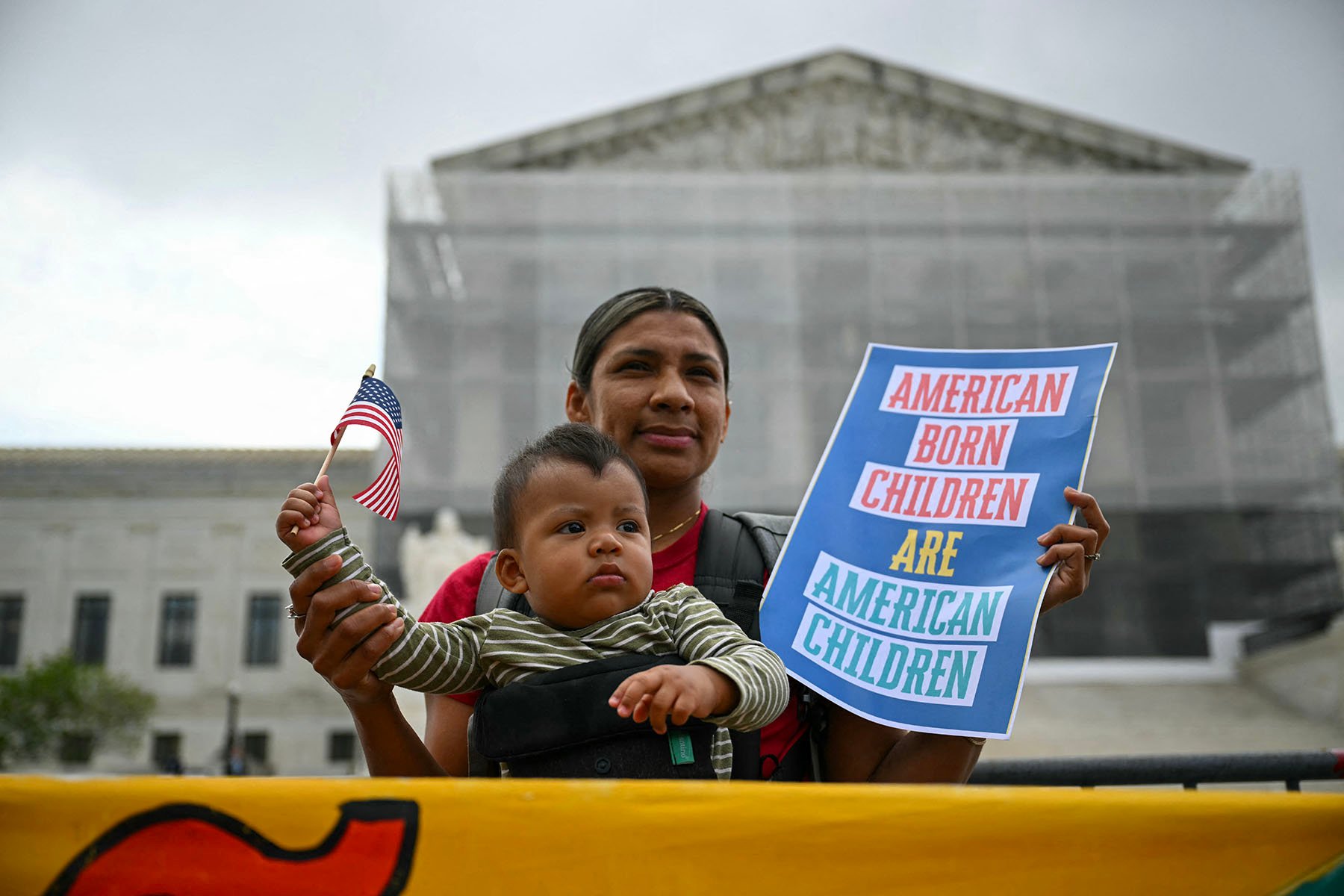Immigrant parents potentially impacted by President Donald Trump’s executive order ending birthright citizenship have been thrown into limbo in the wake of a Supreme Court ruling that weakened the power of lower courts to issue injunctions that block White House policies nationwide.
Advocacy groups working on behalf of impacted families rushed to file lawsuits Friday that seek to expand the number of people shielded, at least temporarily, from the executive order, hoping to leave no immigrant child without birthright citizenship rights.
For immigrant parents expecting babies, the ruling has prompted a frantic search for more information about whether the order applies to their prospective children.
While challenges to the executive order move through the courts, the administration will only be blocked from enforcing its order against some immigrants. That will likely include people in the 22 Democrat-led states that directly challenged the order, along with the members of two immigrants’ rights organizations and individually named plaintiffs. The Supreme Court ordered the lower courts to “expeditiously” reexamine which plaintiffs will be covered by more narrow injunctions.
Immigrant parents who expect to give birth soon in one of the 28 Republican-led states that didn’t challenge the executive order are in a more “tenuous” situation, said Massachusetts Attorney General Andrea Campbell. Campbell emphasized, however, that her office, along with other Democratic attorneys general and civil rights groups, would fight to shield every impacted family from the executive order.
The American Civil Liberties Union (ACLU) joined a handful of other organizations on Friday to file a nationwide class-action lawsuit in federal district court in New Hampshire on behalf of babies who may not be granted citizenship at birth under the executive order and also their parents. The lawsuit proposed to create a protected class of impacted children so that any ruling would apply to immigrant families across the country.
“Every court to have looked at this cruel order agrees that it is unconstitutional,” said Cody Wofsy, deputy director of the ACLU’s Immigrants’ Rights Project and lead attorney in the class-action lawsuit. “The Supreme Court’s decision did not remotely suggest otherwise, and we are fighting to make sure President Trump cannot trample on the citizenship rights of a single child.”
A separate coalition of immigrant advocacy groups led by the Asylum Seeker Advocacy Project and CASA filed a similar motion in federal district court in Maryland, asking for nationwide class-action protections for babies and parents potentially impacted by the executive order. The groups are asking the court to issue an immediate order temporarily protecting these babies and parents while the class-action lawsuit makes its way through the court.
“That relief will be just as effective — just as broad — as the nationwide injunction that was previously in place,” said William Powell, a lawyer with the Institute for Constitutional Advocacy and Protection, one of the groups involved in that lawsuit. “So we don’t think this order should go into effect, or will go into effect as to anyone, anywhere, ever, and it is our intention to continue to fight to make sure that doesn’t happen.”
The ruling says that Trump’s executive order can’t go into effect sooner than July 27. It’s not immediately clear when the district courts in New Hampshire and Maryland will issue orders in the cases filed Friday.
Signed hours after Trump took office, the birthright citizenship executive order was quickly blocked by multiple federal court judges, who held that the order likely violates the U.S. Constitution. For more than 150 years, the 14th Amendment has guaranteed birthright citizenship, stating that “all persons born” in the United States “are citizens of the United States and of the State wherein they reside.”
The administration asked the Supreme Court to weigh in on the case — not on the executive order directly, but rather on the nationwide injunctions seeking to block it. The administration argued that these orders give too much power to a single judge at the expense of presidential power.
Friday’s ruling did not address whether the executive order violated the Constitution, a question that right now is not before the Supreme Court.
In a 6-3 ruling led by Justice Amy Coney Barrett on three cases — Trump v. CASA, Inc., Trump v. Washington and Trump v. New Jersey — a coalition of conservative justices ruled that “federal courts do not exercise general oversight of the Executive Branch.”
Trump’s executive order, “Protecting the Meaning and Value of American Citizenship,” would exclude two categories of infants from the right to U.S. citizenship: infants born to a mother who is unlawfully in the country and a father who is not a citizen or permanent resident, and infants born to a mother who is authorized to be in the country for a temporary period of time and a father who is not a U.S. citizen or permanent resident.
The latter group includes people in the United States with a work, student or tourist visa. It’s unclear how it would apply to the children of LGBTQ+ couples or single moms since the order goes on to define mother and father as male and female “biological progenitors.” The order directs federal agencies to deprive these newborn babies of legal documents such as Social Security cards and U.S. passports.
U.S. Attorney General Pam Bondi called Friday’s ruling a “huge win” and said the White House expects the Supreme Court to rule on the legality of the executive order by the fall.
Bondi said the administration was “very confident” the justices would rule in the administration’s favor again and greenlight the administration’s policy to end birthright citizenship. “Birthright citizenship will be decided in October, in the next session by the Supreme Court,” Bondi said. The administration hasn’t asked the Supreme Court to weigh in on the legality of the order, and pending cases on the matter are moving through the lower courts.
The three liberal justices on the court dissented with Friday’s decision. They were led by Justice Sonia Sotomayor, who wrote that the ruling renders “constitutional guarantees” meaningless.
“No right is safe in the new legal regime the Court creates,” Sotomayor wrote. Friday’s ruling, she argued, robs the lower courts of the power to protect people even in the face of “plainly unlawful policies,” by making it more difficult for the courts to grant relief broadly.
Sotomayor also wrote that the administration didn’t ask the Supreme Court to allow the birthright citizenship order to go fully into effect because proving that the policy is likely legal before the Supreme Court would be “an impossible task in light of the Constitution’s text.”
In her dissent, Justice Ketanji Brown Jackson said Friday’s ruling poses “an existential threat to the rule of law.”
The Trump administration’s “bid to vanquish so-called ‘universal injunctions’ is, at bottom, a request for this Court’s permission to engage in unlawful behavior. … With its ruling today, the majority largely grants the Government’s wish,” Jackson wrote. “With deep disillusionment, I dissent.”
Coney Barrett, in the majority opinion, said the minority’s arguments hinged on the unconstitutionality of the birthright citizenship order, which she said wasn’t a question before the court. Coney Barrett also lambasted Jackson’s opinion.
“Justice Jackson decries an imperial Executive while embracing an imperial Judiciary,” Coney Barrett wrote, joined by the other conservative justices. “Justice Jackson would do well to heed her own admonition: ‘Everyone, from the President on down, is bound by law.’ That goes for judges too.”
Attorneys general and organizations challenging the executive order argued last month that a ruling in the administration’s favor will cause untold harm to the children of immigrants born on U.S. soil, their families and broader immigrant communities. They also argued that it would bring about chaos for states trying to provide services to newborn children born in legal limbo.
Jeremy Feigenbaum, the solicitor general of New Jersey, told the court that the state would be burdened with having to verify the citizenship of babies who are denied citizenship in one state and then move to New Jersey or any other of the 21 states challenging the order. The result would be “chaos on the ground,” as “people’s citizenship turns on and off when you cross state lines.”
Friday’s ruling undermines the Constitution and could prove devastating to immigrant families expecting children, argued the advocates who sued over the order.
“Today’s decision sends a message to U.S.-born children of immigrants that their place in this country is conditional,” said George Escobar of CASA, whose lawsuit on behalf of their members and five pregnant women who would be impacted by the order is one of the three cases impacted by the court’s decision.
“But we are not backing down. CASA will keep fighting until the rights of all our children are fully recognized and protected,” Escobar said.
“Hundreds of thousands of other U.S.-born children are in danger of not receiving U.S. citizenship,” said one of the plaintiffs, a Venezuelan immigrant who asked to be identified only as Monica and who expects to give birth to a child in South Carolina this summer. She called the ruling “devastating.”
“I know that every pregnant mother cannot file a lawsuit to make sure their children have U.S. citizenship – that is why I filed this lawsuit to not only protect my child’s rights, but the constitutional rights of all U.S.-born children of immigrants.”






